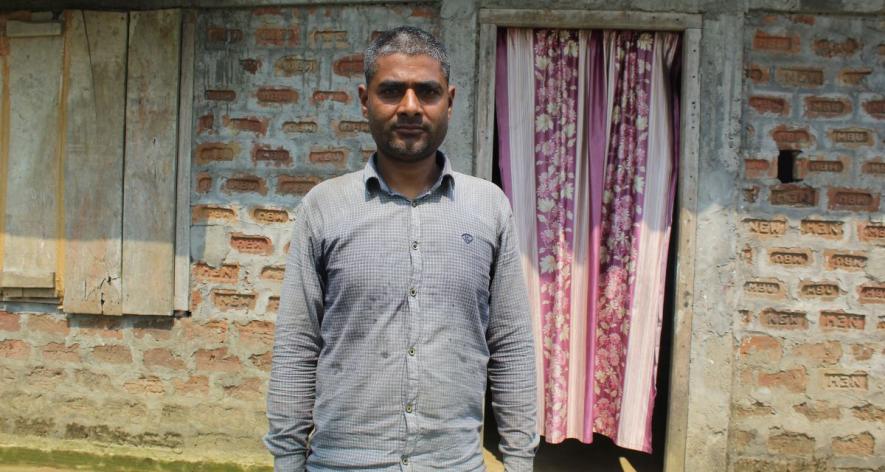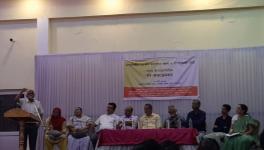Assam: Margherita’s Collieries Sink into Oblivion, Push Workers to the Brink

Agniprasad Gowala (34) of Mulong Gaon Village (Photo - Purnima Sah,) Image Courtesy: 101Reporters
Margherita: The hustle-bustle that once defined the coal town of Margherita in Assam’s Tinsukia district is missing these days. Lorries transporting coal and colliery employees taking tea breaks at small shops were common sights here. But with the collieries in North Eastern Coalfields (NEC) shutting down, the ‘Coal Queen’ is on the brink of losing her black diamond.
According to the 2016 data on state-wise coal resources, Assam contributes 525 Million Tonne Per Annum (MTPA) out of the country's total 3,08,801.84 MTPA. In Tinsukia district, the NEC used to operate six collieries — Tikak, Tirap, Tipong, Ledo, Borgolai and Namdang. Though Ledo, Borgolai and Tipong stopped production in 2009-10, the latter resumed operations in 2010-2011.
However, in 2020, all six were closed due to environmental clearance-related issues and non-availability of land for overburden dumps. The NEC managed to reopen only Tikak Colliery, which has two opencast projects with a combined capacity of 0.40 MTPA, in March last year.
Contractual workers worst hit
Labourers on contract suffered the most when collieries shut. Some took to growing tea or vegetables in their backyards, while others became daily wage labourers in the informal and illegal mining industry that continues to date.
Since his childhood, Agniprasad Gowala (34) of Mulong Gaon in Margherita subdivision has done all sorts of work. “There are no industries except coal. When one is hungry for days, one does not understand what is legal and illegal and will do anything to get a meal,” Gowala, whose family moved here from Odisha three generations ago, told 101Reporters.
His father was a mine worker, but he slipped and fractured his hip while carrying coal on a rainy day. He could not get back to work since then. Gowala was barely five when he, along with his mother and two brothers aged below 12, had to climb the hills to source coal and sell it in eateries and restaurants to make ends meet. Some days they would also collect coal pieces from the banks of River Dihing.
“My mother was denied a dependent employee’s job citing spelling mistakes in ration card and voter ID. My brothers and I could not get a job either. So we became contractual labourers in different collieries. We were doing fine, but when coal mines began to shut down, we had no option but to turn to illegal mining,” said Gowala.
They have to start before dawn to reach Patkai Hills for the arduous task. “We climb up to collect coal and come down to fill our sacks multiple times. By 8 am, we have to be on our bicycles or carry the sacks on our shoulders to sell them to agents for Rs 600 to 700 per kg. I have carried 139 kg in a day when there was no money at all. It is very risky as we do not know the hills much. Some people died in landslides, and some slipped while climbing up with coal-laden sacks,” narrated Gowala, a father of two.
Changing circumstances
An NEC case study by the Indian Institute of Technology Kanpur’s Just Transition Research Centre (JTRC) states that a sizable population dependent on the coal sector find their economic and social security threatened due to mine closures. Of the 172 respondents, 108 said the livelihoods of both coal workers and residents of Margherita had seen drastic changes.
As per the study, 52% said their income decreased, while 20% said they lost their jobs. Another 13% faced business recession, while 5% took up odd jobs such as weaving baskets required for coal mining and opening bicycle repair shops. Only 5% of the respondents reported no change in livelihood.
The report also highlights the plight of contractual labourers who went unrecognised by the colliery management. “Their condition worsened to the point that they starved for nights, which also pushed the female family members to prostitution,” explained Suprio Basu of the JTRC.
The JTRC report highlighted the need to explore local non-coal enterprises such as bamboo-based handicrafts, computer/automobile/agro-input enterprises, brick industry, and agro-produce dealerships.
Today, coking coal bhattas (kilns) have become major hubs of the illegal coal trade. Basu Sharma (46) from Telkhat village near Borgolai is the production manager in one such kiln located just 500 m from his home. “There is no future in coal. I do not want my two children to enter this industry. With current mining restrictions, the future seems totally dark in Margherita. If the government can think of bringing another industry, it will be a game changer for our people,” said Sharma, whose wife runs a grocery store since the mines shut.
Amrita Tamang (26) had to assume all domestic responsibilities at the age of 17 following her father’s death in a road accident in 2014. At that time, her brother was only three. Till then, they used to live in Borgolai quarters, and their father used to work in Ledo Colliery. A year after his death, Tamang’s mother got a job on dependent quota. But it was in faraway Ranchi, the capital of Jharkhand.
Within two years of her mother shifting to Ranchi, Tamang and her extended family had to vacate the quarters “as the colliery was shutting down”. They then moved in with their aunt in Borgolai and have been living there on rent since then.
Tamang and her brother have been struggling to get free medical treatment at the NEC hospital in Margherita. “The medical staff tell us that we can get free treatment and medicines only in Ranchi as our mother works there. We are trying for her transfer back to Margherita and are hopeful that collieries will restart soon,” said Tamang, who tutors schoolchildren and stitches clothes to earn some money.
A ghost town in the making
Borgolai resembles a ghost town with colliery quarters either locked up or in a dilapidated condition. Monika Konwar (50) moved to Ledo in 2000. Her family is the only one living in their colony. Konwar’s husband is a teacher in the colliery school, which was converted into a government school after the mines were closed.
According to Konwar, all her neighbours left the village forever. Some retired, some were transferred, some migrated, and some died. “When we came here, the village was so vibrant. Now, walking on empty roads feels so spooky even in the daytime,” said Konwar, who weaves Assamese gamcha and mekhla sador and sells them in the Tinsukia market. Her two daughters and a son are pursuing higher education in Guwahati and Margherita and do not wish to join the colliery.
Rubul Bora from Namdang Golai turned 30 in April, but he had nothing to cheer about as his aspirations were all dependent on a job in the NEC. After his father’s death in 2017, Bora wanted to become a mining overseer. He had cleared the joint entrance examination in mining engineering in 2015 before doing post-diploma practical training at Tipong Colliery the same year. By 2016, he had cleared all the exams.
“In August 2017, I saw an NEC advertisement about an opening for Overman and Deputy Surveyor (Mines). I was very hopeful, but they withdrew it without any intimation. I, along with 20 others, wrote to the state government multiple times, but nothing happened. We recently learnt that the job was cancelled,” said Bora, who went to Nagpur, Pune, Odisha and Ranchi looking for employment but was only offered the work of a mine labourer.
“I do not deserve that job because I put a lot of work into my studies. I left these places after six months of contractual labour.” Bora now works as a chef in Margherita. “If Tipong or another colliery reopens, I will definitely give it a try,” said Bora, not giving up on his dream job.
(Purnima Sah is an Assam-based freelance journalist and a member of 101Reporters, a pan-India network of grassroots reporters)
Get the latest reports & analysis with people's perspective on Protests, movements & deep analytical videos, discussions of the current affairs in your Telegram app. Subscribe to NewsClick's Telegram channel & get Real-Time updates on stories, as they get published on our website.
























